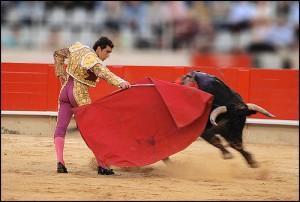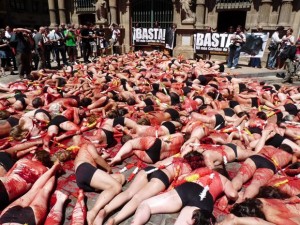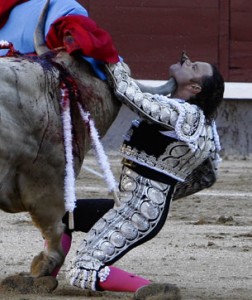National pastime: A thing of the past?
 After 8 months of calling Bangkok home, I moved on and set off for Madrid to embark on a month-long brother-sister adventure through Western Europe. As I walk the city streets today I think about what defines this culture. I think of sangria and tapas, of late dinners and long nights, of Picasso and Goya, and finally of the Spanish bull, arguably Spain’s most iconic symbol. The bullfights have defined my image of the country since I first laid eyes on a wrinkled bullfighting poster in my grandmother’s basement. Only on my first trip to Spain at age 15 did I realize that my uncle Jim Martin was not, in fact, a famous bullfighter. (Customized bullfighting posters are one of Spain’s most popular souvenirs.)
After 8 months of calling Bangkok home, I moved on and set off for Madrid to embark on a month-long brother-sister adventure through Western Europe. As I walk the city streets today I think about what defines this culture. I think of sangria and tapas, of late dinners and long nights, of Picasso and Goya, and finally of the Spanish bull, arguably Spain’s most iconic symbol. The bullfights have defined my image of the country since I first laid eyes on a wrinkled bullfighting poster in my grandmother’s basement. Only on my first trip to Spain at age 15 did I realize that my uncle Jim Martin was not, in fact, a famous bullfighter. (Customized bullfighting posters are one of Spain’s most popular souvenirs.)
The shops around La Plaza Mayor are plastered with images of swift matadors fooling their beasts. Vendors sell stickers, t-shirts and keychains with the famed Spanish bull to flocks of tourists looking to take home a memory of their holiday. The bullfighter is Spain’s celebrity without a face, respected and admired by Spaniards and visitors alike. But not everyone is a fan of this cultural institution.
My brother reminds me that bullfighting is on thin ice. Ethical questions surrounding the  centuries-old tradition (a tradition that defines the country) could perhaps end it for good. Effective January 1st of this year, Catalonia became the first region to ban it. It’s viewed as a cruel blood sport, in which the bull suffers a long and painful death in front of thousands of spectators. Groups like Antitauromaquia, SopOurShame, and PETA continue to fight to put an end to bullfighting. They hope that the rest of Spain will follow Catalonia’s lead and abolish the tortuous sport for good.
centuries-old tradition (a tradition that defines the country) could perhaps end it for good. Effective January 1st of this year, Catalonia became the first region to ban it. It’s viewed as a cruel blood sport, in which the bull suffers a long and painful death in front of thousands of spectators. Groups like Antitauromaquia, SopOurShame, and PETA continue to fight to put an end to bullfighting. They hope that the rest of Spain will follow Catalonia’s lead and abolish the tortuous sport for good.
Though only the bulls are condemned to die, matadors also face potentially-fatal risks. Fighters have been paralyzed, gored, and even killed as they have carry on this tradition in the bullring. Remember the bullfighter who was gored in the neck last October? The now recovered Juan Jose Padilla continues to stand by Spanish tradition, and has returned — albeit with an eyepatch and a paralyzed face — to the ring. “I regret that there are people who have a contemptuous image of the corrida. These people are not familiar with our art. They reject bullfighting out of ignorance. Injuries are my medals – and now I’ve won gold.”
 Would an end to bullfighting culture change the country for the better? Would eliminating the “art” of bullfighting also eliminate the most important part of Spanish culture? Supporters argue that bullfighting is fair and noble, a sovereign spectacle that belongs to the people. They maintain that activists should dedicate their time to other issues such as poverty, education, and healthcare instead of wasting it on taking away the soul of Spanish culture.
Would an end to bullfighting culture change the country for the better? Would eliminating the “art” of bullfighting also eliminate the most important part of Spanish culture? Supporters argue that bullfighting is fair and noble, a sovereign spectacle that belongs to the people. They maintain that activists should dedicate their time to other issues such as poverty, education, and healthcare instead of wasting it on taking away the soul of Spanish culture.
What do you think? Would Spain still be Spain in the absence of the matador and his beast?

May 23rd, 2012 at 11:52 am
I don’t think bullfighting defines Spanish culture, as neither does flamenco. These are only a small part of Spanish culture. The most visible, perhaps, but still only a part. You could say I am biased, as I am from Barcelona (Catalonia) where we have our own language and culture and sometimes we don’t identify with the rest of the country. I personally agree with the ban. I think Spain will still be Spain without bullfighting. We have plenty of other things that define us, especially nowadays. I see bullfighting and flamenco as a very old fashioned, outmoded expression of culture, very 50’s, and I think most young people in Spain see it the same way. Even without the ban it’s doomed and it will eventually dissapear.
May 23rd, 2012 at 2:53 pm
Olga is right, of course. Though the same thing could be said about castles and cathedrals and all those other outmoded expressions of culture that came before our brave new world.
May 23rd, 2012 at 11:37 pm
At one time gladiator games, dog-fighting, cock fights etc… were the norm. I think Spain can live without bull fighting. As mentioned there is a lot more to Spain and the Spanish people than this. I think it is time to give up the blood sport and move along into the modern age, leaving this “past-time” in history.
May 24th, 2012 at 4:19 pm
I’m not sure if it would really “change the country for the better”, but as an outsider, I see the tradition as archaic and barbaric. I don’t only associate Spain with bullfighting, and I don’t think others do either.